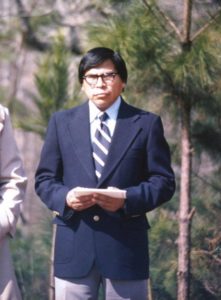
- Details
- By Native News Online Staff
CHOCTAW, Miss. — The Mississippi Band of Choctaw announced the death of former Tribal Chief Calvin J. Issac, who served as the first tribal chief since the great Pushmathana. Chief Issac passed away Saturday after battling a long illness. He was 86.
“TaRita and I, along with all Tribal Members, join the grieving family over the loss of our first Tribal Chief. He will be greatly missed,” said current Tribal Chief Cyrus Ben. “I had the great opportunity of knowing Chief Isaac my entire life. He was always a teacher, and I value his words of wisdom. We send our prayers to the entire Isaac family, as we honor the life and legacy of Chief Calvin Isaac.”
Elected in 1975, Isaac served one term as tribal chief. He also served on the Tribal Council and worked in tribal education for over 15 years as a teacher and principal.
Chief Isaac graduated from Meridian High School and received his bachelor’s degree in Music Education from Delta State University in 1958. That fall he joined the U.S. Army. After his time in the military Mr. Isaac went to Mississippi State University where he obtained a master’s in education, becoming the first Choctaw to graduate with a master’s degree.
Out of respect for the family, and to honor Chief Isaac’s memory, Chief Ben has ordered the lowering of all Tribal Flags throughout Choctaw Tribal lands.
More Stories Like This
Native News Weekly (August 25, 2024): D.C. BriefsNavajo Nation Mourns the Passing of Former Vice President Rex Lee Jim
Deb Haaland Earns Endorsement From Communications Workers of America Local 7076
University Soccer Standout Leads by Example
Two Native Americans Named to Democratic Congressional Campaign Committee's“Red to Blue” Program
Help us defend tribal sovereignty.
At Native News Online, our mission is rooted in telling the stories that strengthen sovereignty and uplift Indigenous voices — not just at year’s end, but every single day.
Because of your generosity last year, we were able to keep our reporters on the ground in tribal communities, at national gatherings and in the halls of Congress — covering the issues that matter most to Indian Country: sovereignty, culture, education, health and economic opportunity.
That support sustained us through a tough year in 2025. Now, as we look to the year ahead, we need your help right now to ensure warrior journalism remains strong — reporting that defends tribal sovereignty, amplifies Native truth, and holds power accountable.
 The stakes couldn't be higher. Your support keeps Native voices heard, Native stories told and Native sovereignty defended.
The stakes couldn't be higher. Your support keeps Native voices heard, Native stories told and Native sovereignty defended.
Stand with Warrior Journalism today.
Levi Rickert (Potawatomi), Editor & Publisher

